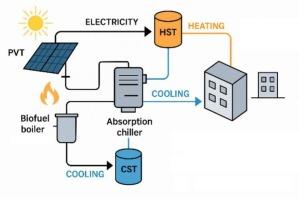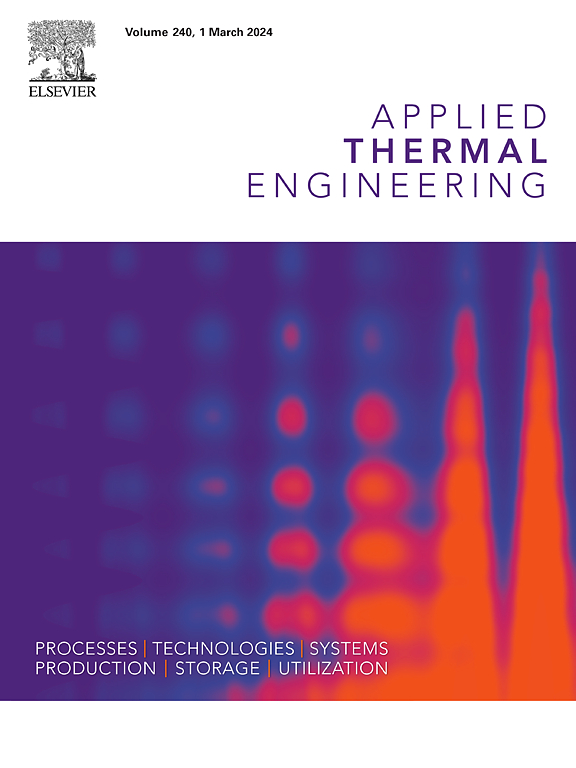用于可持续建筑能源应用的动态太阳能-生物燃料三联发电系统的技术经济和环境评价
IF 6.9
2区 工程技术
Q2 ENERGY & FUELS
引用次数: 0
摘要
建筑行业是主要的能源消耗者,也是温室气体排放的主要贡献者,因此向可再生能源的过渡对实现可持续发展至关重要。本研究研究了一种混合太阳能-生物燃料三联发电系统,该系统旨在为建筑物提供供暖、制冷和电力,旨在减少对化石燃料的依赖并改善环境绩效。该系统集成了光伏热(PVT)面板、生物燃料锅炉、吸收式制冷机和储热罐,并在北京夏季炎热、冬季严酷的真实气候条件下模拟了其瞬态性能。该分析结合了技术经济、环境和消耗经济评估,以及对关键参数的敏感性分析,包括锅炉效率、冷水机组COP和贴现率。结果表明,在冬季,生物燃料供暖确保了可靠的供应,峰值输出高达1980千瓦,而在夏季,太阳能贡献了高达70%的冷却需求,减少了生物燃料的消耗。该系统可实现高达0.37 kg/kWh的二氧化碳减排,并根据季节条件提供0.15至0.48美元/kWh的平准化能源成本(LEC)。新颖的贡献包括敏感性和消耗经济分析的整合,以及系统与国际绿色建筑标准(LEED/BREEAM)的一致性评估,提供了超越以往研究的见解。本文章由计算机程序翻译,如有差异,请以英文原文为准。

Techno-economic and environmental evaluation of a dynamic solar-biofuel trigeneration system for sustainable building energy applications
The building sector is a major energy consumer and a key contributor to greenhouse gas emissions, making the transition to renewable energy essential for achieving sustainable development. This study investigates a hybrid solar-biofuel trigeneration system designed to supply heating, cooling, and electricity for buildings, aiming to reduce fossil fuel reliance and improve environmental performance. The system integrates photovoltaic thermal (PVT) panels, a biofuel-fired boiler, an absorption chiller, and thermal storage tanks, with its transient performance simulated under real climatic conditions in Beijing, characterized by hot summers and harsh winters. The analysis incorporates techno-economic, environmental, and exergoeconomic assessments, as well as a sensitivity analysis of key parameters, including boiler efficiency, chiller COP, and discount rate. Results show that during winter, biofuel heating ensures reliable supply with peak outputs up to 1980 kW, while in summer, solar energy contributes up to 70 % of cooling demand, reducing biofuel consumption. The system achieves CO2 emission reductions of up to 0.37 kg/kWh and delivers a levelized energy cost (LEC) between 0.15 and 0.48 $/kWh, depending on seasonal conditions. Novel contributions include the integration of sensitivity and exergoeconomic analyses, as well as an evaluation of the system’s alignment with international green building standards (LEED/BREEAM), providing insights beyond previous studies.
求助全文
通过发布文献求助,成功后即可免费获取论文全文。
去求助
来源期刊

Applied Thermal Engineering
工程技术-工程:机械
CiteScore
11.30
自引率
15.60%
发文量
1474
审稿时长
57 days
期刊介绍:
Applied Thermal Engineering disseminates novel research related to the design, development and demonstration of components, devices, equipment, technologies and systems involving thermal processes for the production, storage, utilization and conservation of energy, with a focus on engineering application.
The journal publishes high-quality and high-impact Original Research Articles, Review Articles, Short Communications and Letters to the Editor on cutting-edge innovations in research, and recent advances or issues of interest to the thermal engineering community.
 求助内容:
求助内容: 应助结果提醒方式:
应助结果提醒方式:


